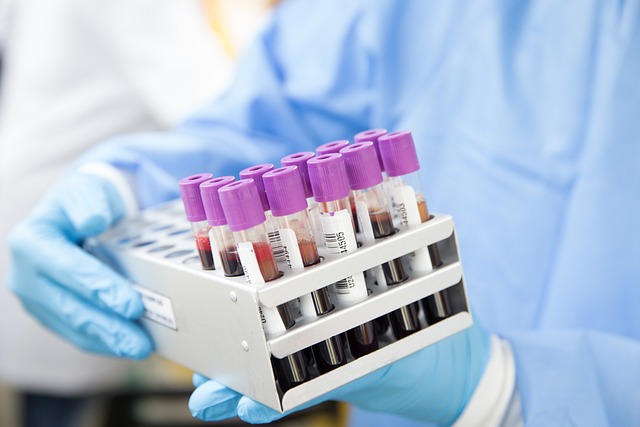Advanced liver function tests (UK Kidney Blood Test) play a pivotal role in diagnosing and managing liver health, detecting conditions like hepatitis, cirrhosis, and cancer. Normal ranges for key enzymes (ALT, AST, ALP, GGT, bilirubin) are crucial for accurate diagnosis. These tests revolutionize care by enabling early detection, disease differentiation, treatment monitoring, and transplantation evaluation, ultimately leading to personalized interventions in the UK healthcare system. Proper test selection, sample handling, and lab protocols ensure accurate results, guiding medical decisions for optimal patient outcomes.
Advanced liver function tests (ALFTs) are essential tools for medical professionals, offering deeper insights into liver health. This article guides practitioners through ALFTs, from understanding their indications and benefits to interpreting results accurately. We discuss normal ranges and anomalies, and provide best practices for performing and ordering UK kidney blood tests, ensuring optimal patient care and diagnosis.
- Understanding Advanced Liver Function Tests: Indications and Benefits
- Interpreting Results: Normal Ranges and Anomalies
- Best Practices for Performing and Ordering UK Kidney Blood Tests
Understanding Advanced Liver Function Tests: Indications and Benefits
Advanced liver function tests go beyond basic assessments, providing in-depth analysis of liver health. These tests are crucial tools for medical professionals in diagnosing and managing liver-related conditions in the UK. By measuring various enzymes, proteins, and other substances in the blood, they offer a comprehensive view of liver functionality. Indications for these tests include suspected liver damage, abnormal liver enzymes, or symptoms like jaundice, fatigue, and abdominal pain.
The benefits are significant, enabling early detection of conditions such as hepatitis, cirrhosis, and liver cancer. It helps differentiate between acute and chronic liver diseases, guiding treatment decisions. Moreover, advanced tests can monitor the effectiveness of treatments, predict disease progression, and assess the need for liver transplantation. This technology revolutionizes liver care, ensuring patients receive timely and personalized interventions.
Interpreting Results: Normal Ranges and Anomalies
When interpreting results from an advanced liver function test, understanding normal ranges and anomalies is crucial for accurate diagnosis. In the UK, a kidney blood test typically measures various enzymes and proteins that indicate liver health. Levels of alanine aminotransferase (ALT), aspartate aminotransferase (AST), alkaline phosphatase (ALP), gamma-glutamyl transferase (GGT), and bilirubin are often evaluated.
Normal ranges vary slightly between laboratories but generally, ALT and AST levels below 40 U/L (units per litre) are considered within the reference range. Elevated levels of these enzymes may suggest liver damage or inflammation. ALP levels usually fall between 40 and 140 U/L, while GGT levels should be under 50 U/L in men and under 35 U/L in women. Bilirubin, a breakdown product of red blood cells, is typically measured in micromoles per litre (μmol/L), with levels below 17 μmol/L being considered normal for adults. Any significant deviation from these ranges may indicate underlying liver conditions that require further investigation using additional tests or imaging studies.
Best Practices for Performing and Ordering UK Kidney Blood Tests
Performing and ordering UK kidney blood tests requires adherence to best practices to ensure accurate results and optimal patient care. When indicating a UK Kidney Blood Test, medical professionals should consider the patient’s clinical presentation, medical history, and recent medications alongside any relevant symptoms. This comprehensive approach aids in tailoring test selection, ensuring that only necessary markers are evaluated. For instance, if a patient exhibits signs of acute kidney injury, specific tests like serum creatinine, urea nitrogen, and estimated glomerular filtration rate (eGFR) become paramount.
In the laboratory setting, proper handling and processing of samples are crucial. Using appropriate collection containers, minimizing exposure to light and extreme temperatures, and ensuring punctual transportation to the lab can preserve test accuracy. Additionally, adherence to quality control measures, regular calibration of equipment, and adherence to protocol for each test variation are essential practices that contribute to reliable UK Kidney Blood Test results.
Advanced liver function tests, including those used in the UK kidney blood test protocol, offer medical professionals valuable insights into liver health. By understanding the indications, interpreting results accurately, and adhering to best practices, healthcare providers can effectively diagnose and manage liver-related conditions. These comprehensive assessments play a pivotal role in optimizing patient outcomes and enhancing overall liver care within the UK’s healthcare system.
